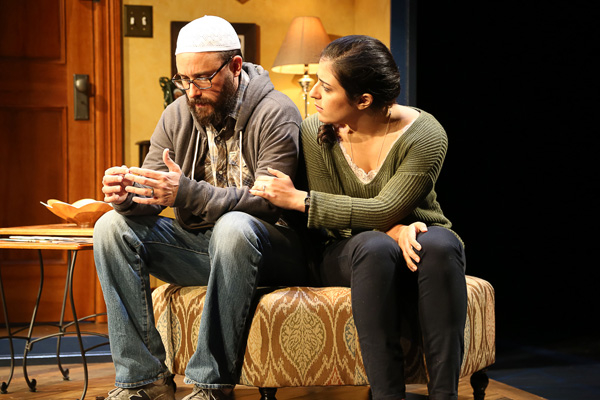The Who & the What
Ayad Akhtar’s funny and insightful new play tells a story of uncomfortable questions and the courage needed to ask them.

(© Erin Baiano)
Polite society often entails a certain amount of organized terror. It governs what we say, how we dress, and whom we're allowed to marry. Ayad Akhtar digs deep into this terror (and suggests how it can be combated) in his new play The Who & the What, now making its New York premiere at LCT3's Claire Tow Theater. Akhtar earned the Pulitzer Prize for drama for his last play at LCT3, Disgraced, which recently announced a Broadway run. The Who & the What has all the transgressive intelligence of that earlier play, but allows more time for the drama to percolate, resulting in a truly explosive climax. On top of that, it's also quite funny.
Afzal (Bernard White) is living the American dream. Originally a humble immigrant from Pakistan, he now owns 30 percent of all the taxicabs in Atlanta. He also has two beautiful daughters from his late wife. Mahwish (Tala Ashe) is a nurse-in-training engaged to her childhood sweetheart, Haroon. Zarina (Nadine Malouf) is a Harvard-educated novelist working on a book about women in Islam. A conservative Muslim, Afzal tries to set Zarina up with Eli (Greg Keller), a local Imam and Muslim convert.
It all sounds like an infomercial for the Council on American-Islamic Relations, right? The only problem is that Zarina's book is asking some pretty big questions about the prophet Muhammad: Were his prophecies just justifications for his human failings and desires? Is the Quran really the word of God? Is Allah a woman? All of this is clear blasphemy to a man like Afzal and when he discovers the contents of Zarina's book, it threatens to rip his family apart. He has to decide where his faith lies: with his daughter or his God.
Everything plays out on Jack Magaw's music box of a set, which is divided into thirds and framed by Islamic latticework (which has also overtaken the proscenium). Each third moves upstage or downstage depending on the scene, giving us a crystal-clear understanding of the location. Emily Rebholz costumes Afzal perfectly in a tucked-in shirt constantly covered by a college sweatshirt. Everything onstage suggests the comfort and safety of Middle America.
Still, the vague and menacing threat of terror hangs over the proceedings, complicating Afzal's decision. "In Pakistan? She would be killed for this. Killed," he spouts with fury, later adding, "You think they can't hurt you here?" White gives a compellingly sympathetic performance for a man whose lines practically drip with patriarchal misogyny and whose tactics regularly employ emotional blackmail. While he is obviously offended by his daughter's ideas, his deep love for her leads him to worry for her safety (and that of the rest of his family) above everything else. After all, Salman Rushdie spent decades in hiding for a book that wasn't nearly so suggestive.
Standing firm for her work, Malouf strikes a no-nonsense tone from her earliest moments onstage. Biographies of Muhammad bump up against volumes of Derrida on her bookshelf. She's unapologetically intellectual; Akhtar's incisive text feels perfectly natural tumbling out of her mouth. She and Ashe have a convincing sisterly bond. Their scenes are among the most developed. Malouf has a special chemistry with Keller, however, who plays Eli with all the angst one would expect from a devoted Muslim convert raised by atheist Marxists. Their conversations feel like a particularly sexy PBS special on the history of Islam.
Akhtar's text teems with big ideas that could easily crash together in a dissonant mess. Under Kimberly Senior's steady direction, they come together in a powerful symphony that packs a dynamite punch, but will keep you laughing throughout.
The Who & the What is a blistering rebuke of a traditionalist, unquestioning view of Islam. In a larger sense, it exposes the way we all dumb ourselves down for the sake of harmony with our parents, our neighbor, and our coworkers, no matter what religion we follow. But there are no false equivalencies here. By zeroing in on the real threat of violence faced by those who would challenge Islamic orthodoxy, Akhtar helps us to understand Zarina's courage even more.
The fact is, The Who & the What could not legally or safely be produced in many parts of the world. That alone should make you want to run out and see it.











